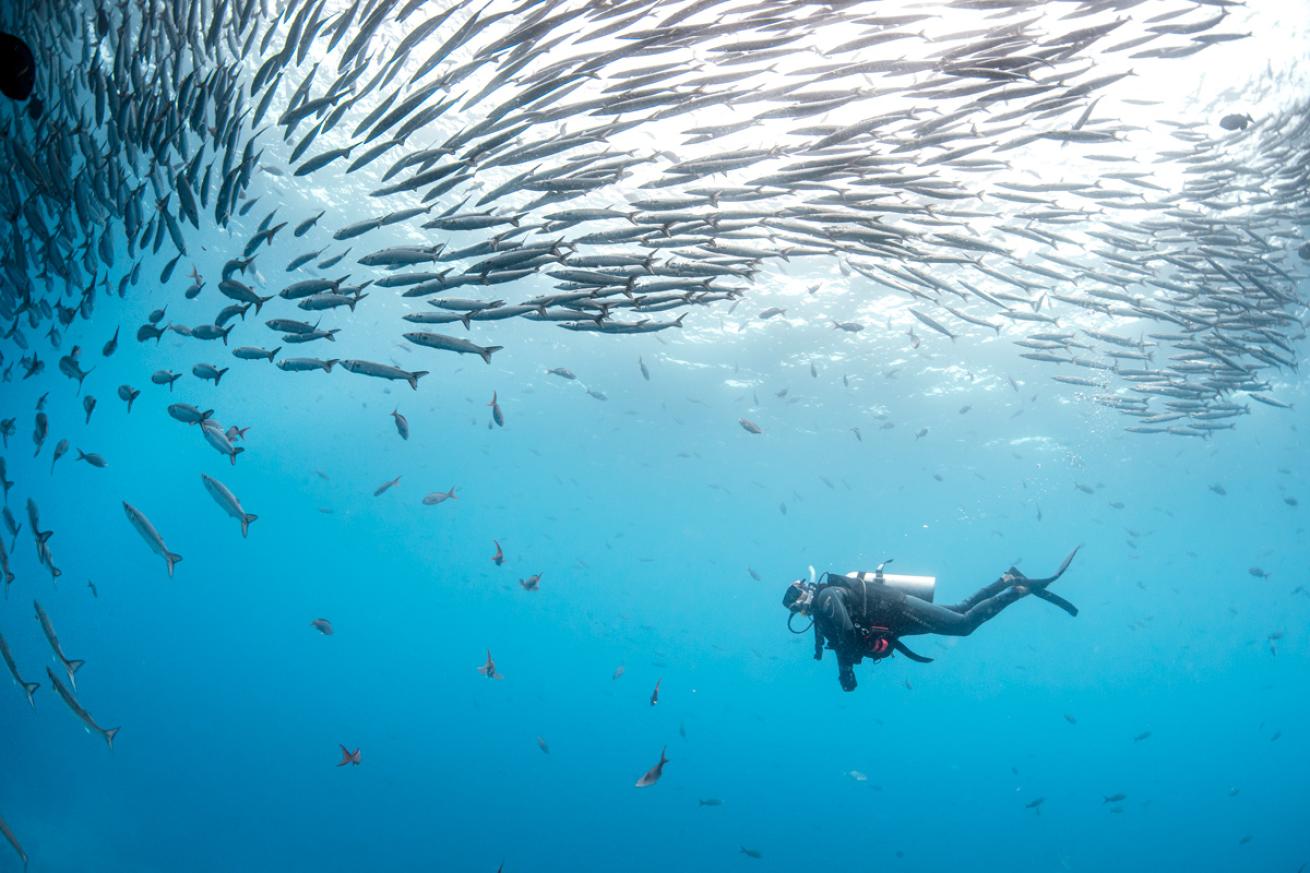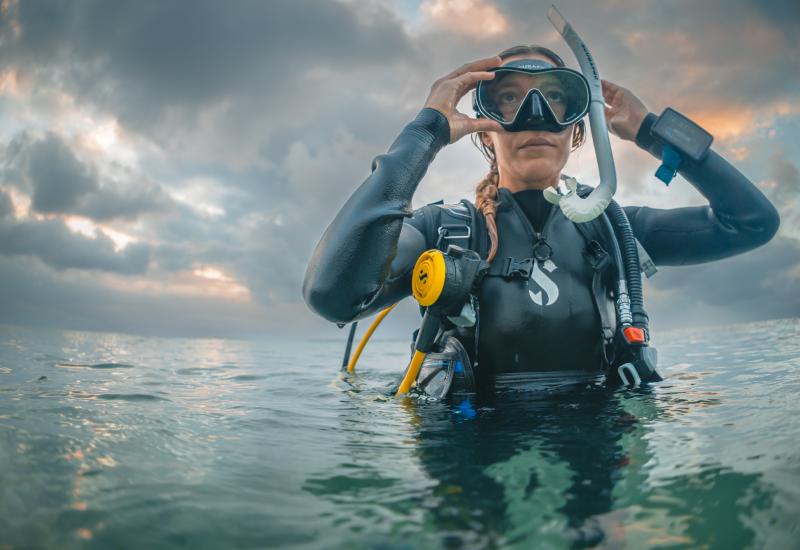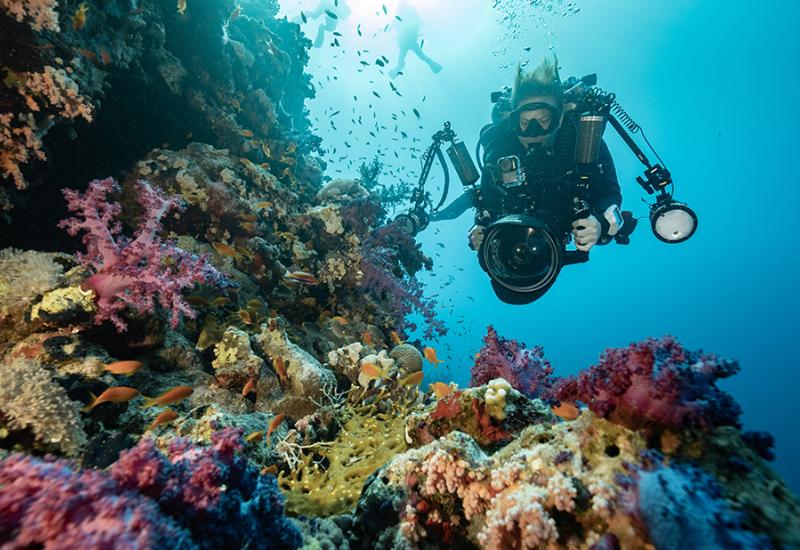How to Protect Your Ears While Diving
The first thing I do on a dive day (which is nearly every day of my life) is check my ears by pinching my nose and gently blowing to equalize, so if something is off, I can tell. Obviously, you should never dive if you’re sick or congested, because you can’t equalize. Congestion is common during allergy season, when traveling or in damp environments. Additionally, what you eat and drink, weather, smoke and exhaust can contribute to congestion. Many ear, nose and throat (ENT) doctors recommend decongestants, including a nasal spray 30 minutes before diving, to people prone to allergies or mild congestion. If you often feel stuffed up before diving or for your second dive, check with your doctor for recommended treatment.

Annie CrawleyRemember to equalize your ears when diving with fish, such as these barracuda at Malpelo Island, as they change depths in blue water.
Equalization Techniques
Make sure you can equalize before going into the water. You can pinch your nose and gently blow to feel a popping in your ears, swallow to allow the muscles around the Eustachian tubes to add air to the middle ear, or wiggle your jaw. It should be easy to clear your ears for diving. What’s important to know is your personal go-to method for equalizing and ensuring you can clear before getting into the water. Reduce congestion on the surface by keeping your snorkel or reg in your mouth and your mask in place to reduce the water that may enter your airway and cause mucus. As you descend, equalize your ears immediately just below the surface and continue to equalize every couple of feet. If one ear feels blocked, stop immediately, go up a few feet and try again. Never try to go deeper by pushing your ears and forcing an equalization. A good rule of thumb is: Equalize your ears often as you descend. Once you descend, continue to equalize throughout your dive. Always follow the ABCs of diving: protect your airway, breathe slowly and continually clear your mask and ears.
Common Outer Ear Issues
You may experience a feeling of water in your ears after diving, which, left untreated, can lead to pain and infection in your outer ear. This condition is known as swimmer’s ear. There are many over-thecounter solutions that may help protect your ears before and after diving, including EarShield, Swim-EAR and DiverDrops. Many divers choose to create homemade remedies with alcohol and vinegar. The alcohol dries your ear, and the vinegar makes the ear canal more acidic, preventing infection-causing bacteria. While this is a widely used method, you should always consult your doctor before using any homemade remedy to ensure it is safe for your ears.
If wearing a hood or beanie, make sure you rinse it thoroughly and dry it inside-out overnight. There are many organisms in the underwater environment that can cause infections if you don’t wash your gear properly. Wear a hat between dives on windy or cold days to reduce congestion. Be cognizant of where air conditioning blows during meals or overnight, and avoid air blowing directly at your ears. If you have problems with persistent water in your ears, consider vented earplugs like Doc’s Proplugs to prevent water from entering your ears while diving or snorkeling. Many divers struggle to understand the differences between the outer ear, middle ear and inner ear. They are completely different systems, but when impacted, can have similar symptoms such as pain, loss of balance, vertigo, nausea, vomiting or hearing problems. Diving injury to the middle ear is known as barotrauma. The middle ear has only a small air volume, so if not properly equalized, pressure can force fluids into the space. This can occur due to a squeeze during descent, or due to a reverse block on ascent. To avoid barotrauma, the pressure inside your body needs to match the surrounding water pressure. Prolonged pressure or forced equalization can result in barotrauma, so equalize your ears and mask gently and frequently. If you perforate (rupture) your eardrum due to not equalizing, you might feel temporary relief from the squeeze if water enters. However, with a hole in the eardrum, water can reach the middle ear and cause infection or damage. If you suspect a ruptured eardrum, do not dive, as you can cause more damage, and make sure to see an ENT immediately. Ear perforations usually heal themselves over time (weeks to months), but treatment may be necessary. Diving related inner ear problems are very rare but can cause permanent hearing loss. If your ears feel full after a dive and there’s no water in your outer ear, or if you experience loss of hearing, prolonged vertigo, dizziness and nausea after diving, consult a doctor.
Pro Tip
Figure out how to blow your nose into your mask. One piece of snot in your ear canal can prevent equalization. Relieve pressure by ascending a bit, pinching the nostril opposite to the ear that’s blocked, and gently blow into your mask, similar to blowing into a tissue. This frees the mucus from your ear canal. If this doesn’t work and you can’t equalize your ears, end your dive.










